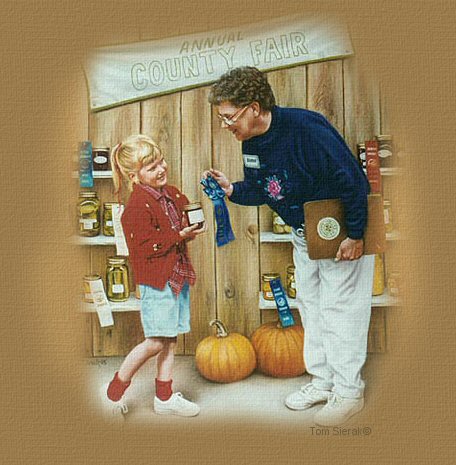|

Bridgewater,
Massachusetts, September 12,
2004
Sermons on Audio



 Isaiah
51:1-8 Everlasting salvation Isaiah
51:1-8 Everlasting salvation 
"Listen
to me, you that pursue
righteousness, you that seek the
Lord: Look to the rock from
which you were cut, and to the
quarry from which you were hewn;
look to Abraham, your father,
and to Sarah, who gave you
birth. When I called him he was
but one, and I blessed him and
made him many. The Lord will
surely comfort Zion, and will
look with compassion on all her
ruins; he will make her deserts
like Eden, her wastelands like
the garden of the Lord. Joy and
gladness will be found in her,
thanksgiving and the sound of
singing.
"Listen
to me, my people; hear me, my
nation: The law will go out from
me; my justice will become a
light to the nations. My
righteousness draws near
speedily, my salvation is on the
way, and my arm will bring
justice to the nations. The
islands will look to me and wait
in hope for my arm. Lift up your
eyes to the heavens, look at the
earth beneath. The heavens will
vanish like smoke; the earth
will wear out like a garment and
its inhabitants die like flies.
But my salvation will last
forever; my righteousness will
never fail.
"Hear
me, you who know what is right,
you people who have my law in
your hearts: Do not fear the
reproach of others, or be
terrified by their insults. For
the moth will eat them up like a
garment; the worm will devour
them like wool. But my
righteousness will last forever,
my salvation through all
generations."
 Matthew
7:15-27 Doing the Lord's work Matthew
7:15-27 Doing the Lord's work 
"Watch
out for false prophets. They
come to you in sheep's clothing,
but inwardly they are ferocious
wolves. By their fruit you will
recognize them. Do people pick
grapes from thorn bushes, or
figs from thistles? Likewise
every good tree bears good
fruit, but a bad tree bears bad
fruit. A good tree cannot bear
bad fruit, and a bad tree cannot
bear good fruit. Every tree that
does not bear good fruit is cut
down and thrown into the fire.
Thus, by their fruit you will
recognize them.
"Not
everyone who says to me, 'Lord,
Lord,' will enter the kingdom of
heaven, but only those who do
the will of my Father who is in
heaven. Many will say to me on
that day, 'Lord, Lord, did we
not prophesy in your name, and
in your name drive out demons
and perform many miracles?' Then
I will tell them plainly, 'I
never knew you. Away from me,
you evildoers!'
"Therefore
everyone who hears these words
of mine and puts them into
practice is like a wise man who
built his house on the rock. The
rain came down, the streams
rose, and the winds blew and
beat against that house; yet it
did not fall, because it had its
foundation on the rock. But
everyone who hears these words
of mine and does not put them
into practice is like a foolish
man who built his house on sand.
The rain came down, the streams
rose, and the winds blew and
beat against that house, and it
fell with a great crash."
Arcana
Coelestia #2009.11 What is a
congregation?
In
Matthew 18:20 we read,
"Where two or three are
gathered together in my name,
there am I in the midst of
them." Those who are
"gathered together in the
Lord's name" are people who
have religious teachings about
love and kindness, and who are
therefore engaged in love and
kindness.

Therefore
everyone who hears these words
of mine and puts them into
practice is like a wise man who
built his house on the rock.
(Matthew 7:24)
We
are now beginning another church
year together, having received
many blessings as a congregation
in recent years, and with new
possibilities ahead of us in the
coming year.
One
of the possibilities that we
hope for each year is that our
congregation will continue to
grow, just as it has been doing
each year for the last five
years. And my message this
morning is simple: If we want
this church to grow, we need to
put the idea of growth on the
back burner, and focus instead
on doing the Lord's work as a
congregation. If we are truly
doing the Lord's work, then
growth will come as a matter of
course, if that is God's will
for our congregation. In other
words, church growth is simply a
natural consequence of being a
real church!
It
is just like the growth of our
bodies. How many of us, as
children, got up every morning
and said to ourselves, "I
think I'll work on growing
today; maybe if I work at it
hard enough, I can add an eighth
of an inch to my height by the
end of the week"? Well . . .
sometimes kids do have funny
thoughts! But most of the time,
we got up in the morning and
went about the business of being
a kid: eating breakfast,
playing, running around outside,
reading a book, doing our
chores, and so on. As we did our
part, eating, sleeping,
exercising our bodies and our
minds, the Lord did his part,
causing us to grow to maturity
both physically and mentally.
In
fact, if, as kids, we were to
concentrate on growing, we would
be more likely to make things
worse than better. We might eat
lots and lots of food, thinking
it would make us grow faster,
only to find that it made us
sick or overweight instead.
Perhaps we would hang by our
knees or our hands for hours and
hours, hoping to stretch out our
bodies. Not much help there! Or,
in this modern age, how about
taking hormone pills to
stimulate growth? We could
certainly do it . . .
and then find out two or three
decades later that those
artificial hormones were
carcinogenic.
Of
course, all of this is a bit
silly. We know that kids grow
naturally. All we have to do is
make sure they get food,
exercise, fresh air, sleep, and
all the other things that the
human body needs to do its work.
Then God and nature will take
care of the rest.
It's
about time we had the same faith
and assurance about the church.
Many churches are focused on
figuring out how to grow. But we
can't make a church grow
any more than we can make
a child grow. As with the growth
of a child, the growth of the
church occurs naturally when all
the conditions and needs for
growth are met reasonably well,
and when the church does what
it's supposed to be doing as a
church.
So
if growth is a natural
consequence of being a normal,
healthy church, just what is a
church supposed to be doing in
order to be normal and healthy?
The short answer is that a
church should be doing the
Lord's work.
Now,
Emanuel Swedenborg was not much
of an institutional guy when it
came to the church. He grew up
as a preacher's kid, so for him,
the institution of the church
was a given. And he seems to
have thought very little about
it in those earlier years of his
life, judging by the fact that
up to his mid-fifties, he wrote
almost entirely on scientific
and philosophical subjects, and
hardly at all about the church,
institutionally or otherwise.
Even when he began writing about
theology and religion, he still
wrote very little about church
organizations--and he certainly
didn't leave us a manual of
ecclesiastical order. He
apparently preferred to focus on
the spiritual side of religion,
and leave others to figure out
the organizational aspects.
In
other words, Swedenborg didn't
explain how to run a church. But
he did leave a few hints here
and there about what the church
is supposed to be. And about the
closest thing I've found to a
definition of a congregation is
found in our brief reading from Arcana
Coelestia #2009. To quote
the salient portion again:
Those
who are "gathered
together in the Lord's
name" are people who have
religious teachings about love
and kindness, and who are
therefore engaged in love and
kindness.
Here
he draws on the Lord's words in
Matthew 18:20. And the Latin
word for "gathered
together" is the one that
our word
"congregation" comes
from. So from a Gospel
perspective, a
"congregation" is two
or three or more people gathered
together in the Lord's name. And
according to Swedenborg, people
are "gathered together in
the Lord's name" when they
have religious, or spiritual,
beliefs about love and kindness,
and as a result of those
beliefs, actually engage
actively in the work of love and
kindness. That's what a
congregation is, and that's what
a congregation does. It believes
in God's teachings about love
and kindness, and actually lives
by those beliefs.
Of
course, our church has many
beautiful teachings about love
and kindness. In fact, all those
thirty green volumes of
Swedenborg's writings with all
that fancy theological
terminology are simply a big,
long version of the Lord's
teaching that we are to love the
Lord most of all, and our
neighbor as ourselves. That's
what it all boils down to.
In
traditional Swedenborgian
language, this is called the
"doctrine of
uses"--which itself is just
a fancy way of saying that if we
want to be truly spiritual, we
can't just learn the
church's teachings; we have to live
by those teachings. We have to
actually go out and do things
for people.
Jesus,
in his usual fashion, doesn't
talk in fancy theological
language. Instead, he uses
down-to-earth stories and images
to get the point across.
"Every good tree bears good
fruit," he says, "but
a bad tree bears bad
fruit." And he is equally
concrete about what happens to
the bad trees--the ones that do
not bear good fruit: "Every
tree that does not bear good
fruit is cut down and thrown
into the fire." The Rev.
George Henry Dole (my
great-grandfather), drawing on
Darwin's catchy phrase "the
survival of the fittest,"
called it "the survival of
the useful." Spiritually,
those who are useful survive and
have eternal life, while those
who are not useful have their
spiritual lives cut down and
thrown into the fire of selfish
and materialistic desires--which
is eternal death.
For
the church, spiritual survival
is also of a more earthly kind.
Those churches that actively
engage in the Lord's work tend
to not only survive, but thrive.
Those churches that focus on
their own survival, however, and
neglect serving their community,
will sooner or later dwindle and
die, no matter how rich they are
in money or spiritual insight.
"Not everyone who says to
me, 'Lord, Lord,' will enter the
kingdom of heaven," Jesus
says, "but only those who
do the will of my Father who is
in heaven."
Then
the Lord goes on to give us
another plain and simple
illustration of this truth.
Those who hear his words and do
them, he says, are like people
who build their houses on the
rock; and when the storms of
life come--as they inevitably
will--the "house" of
their faith and spiritual life
will stand up to the challenges,
and survive. But those who
merely learn the teaching, and
don't put them into practice,
are like people who build their
houses on the sand. And when the
storms of trials and
tribulations come, their faith
is swept away and destroyed
because it has no solid
foundation, but is simply a
castle in the air.
The
Lord's words apply to the
church, and to each
congregation, just as much as
they do to an individual person.
Knowing the truth, as great as
it is, does not in itself do
anything for a congregation. But
when a congregation of people
work together to serve its
neighbors in the community,
doing this in the Lord's name,
then that faith becomes real,
and begins to bear fruit.
It's
a simple, obvious message. We
all know it, and recognize its
truth as soon as we hear it. And
yet, putting it into practice is
the real challenge. So let's get
just a little more specific
about our church.
The
Swedenborgian Church has always
been great at offering Bible
studies, doctrinal classes,
lectures, and books, books,
books on God, salvation, the
spiritual meaning of the Bible,
heaven and hell, and how to live
a spiritual, heaven-bound life.
And I'm not knocking that! These
are all things I personally love
to do; these are gifts we as a
church have been given. And
these are, in fact, good works
of service to whatever audience
we can gather together. This is
the work of preaching and
teaching, and it is important
work.
Where
we have not been so strong is in
the ministry of service and
healing. It's not that we don't
do it at all. Over the years,
our church has done many service
projects of various kinds, from
the former Ladies' Sewing Circle
making quilts for needy families
to today's Sunday School raising
funds to provide farm animals to
third world families.
I
believe that the challenge ahead
of our congregation is to find
ways that we as a church can
serve the local community right
around us. While continuing to
do the work of teaching, we need
to add the practical ministries
of hands-on service to the
people of Bridgewater and the
surrounding communities. And I
am convinced that as we do the
Lord's work more and more, the
Lord will bless our church with
new life and growth. Amen.









Music:
A Distant Shore
© Bruce De Boer
and used with permission

|